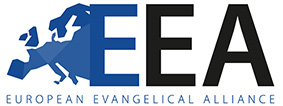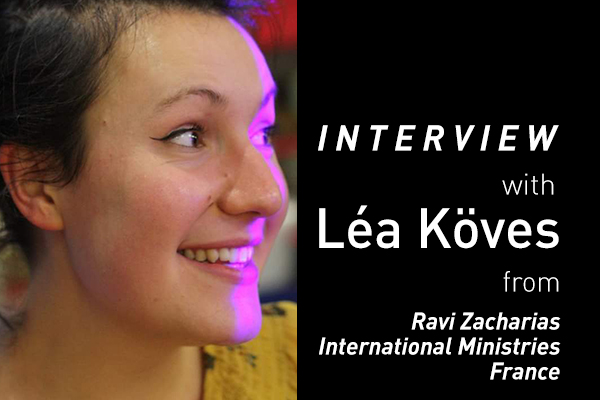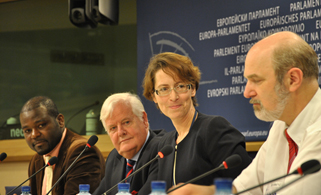Finding biblical wisdom in current societal phenomena
The overarching communication theme for the European Evangelical Alliance in the second half of the year 2020 is “The Relevance of the Bible in European Societies”. Readers of the EEA Newsletter are being presented with different perspectives on this topic over the course of several EEA newsletter editions. We were delighted by the opportunity to conduct an interview with Léa Köves, speaker and employee of the Ravi Zacharias International Ministries (RZIM) in France. RZIM is a global apologetic ministry with the aim to “help the thinker believe and the believer think”, and its European branch is an Affiliate Member of the European Evangelical Alliance.
What is your background and how did you come to work for RZIM France?
First, I wanted to say thank you for having me. It is a real privilege to talk to you about something so close to my heart. I was born and raised in France. I have a background in cultural and linguistic studies with a focus on the English, Spanish, Italian, and French language, and translation work. Therefore, I’ve been thinking a lot about the interactions of languages. Every time that you study a language, you study the people that speak that language, including their different worldviews. I have to say that the presence of the Bible in the language or in the culture at large has really impacted my own faith. As I was passionate about logical thinking and communicating the gospel, I decided to study theology at OCCA, the Oxford Center for Christian Apologetics in the UK. I also purchased a certificate in Theological Studies at the University of Oxford on the side. After the completion of my studies, I moved to Paris and joined Raphaël Anzenberger in his work with RZIM in France and the French speaking world. It has been an exciting adventure so far to explore ways to demonstrate the relevance of the gospel and the Bible.
Coming from a cultural studies and linguistic background, how would you say the Bible has shaped our language and culture?
So many expressions and images are fraught with biblical imagery in our everyday language. How often in our everyday lives do we hear proverbs, such as “an eye for an eye, and a tooth for a tooth”, or “tomorrow will worry about itself, each day has enough trouble of its own”! It is poignant to see that people’s worldviews (which are shaped by the way they use language) are actually shaped by the Bible itself. Sometimes we are aware of the biblical influence, but other times we do not even notice it. In my own conversations, I find it interesting to unfold the idea that the Bible is not an old book put aside on a dusty shelf, but that it is still so vividly present in the way we live. Another area that is greatly shaped by the Bible is the way our society conceptualizes good and evil. Our laws or legal systems in the Western world and specifically in Europe are based on the Bible. Even the obtaining of consent in a civil wedding derives from the biblical idea that matrimony is a covenant which is entered through free will and not just a piece of paper! But there are many other areas in our language and culture that are influenced by the Bible.
If you had to pick one place in Europe that really speaks to you in terms of our biblical heritage where would you lead us?
I am currently sitting in the RZIM France Office, which is located in the basement of a Baptist church in the city center of Nice on the French Riviera. In the 1940s, the Eglise Rue Vernier was led by a pastor called Edmond Evrard. At that time, the Vichy regime ruled France and the French nation betrayed its Jewish citizens, sending thousands of people in trains to Auschwitz. The government even congratulated itself for being very quick and efficient in the loading of the trains. In this very traumatic time of war and fear, the pastor of this church was hiding Jews in the basement, because he felt the divine calling to love his neighbor, and especially his Jewish neighbor. When you pass by this church, you hardly notice it as a church building. But when you enter the basement you cannot but think of what happened almost a century ago, when Edmond Evrard used his church building as a practical tool to love his neighbor and thereby testified to his faith and his love for God. I believe that this image can also be used for the presence of the Bible and faith in our society today. They might be sometimes hard to recognize, but when you scratch the surface just a little bit, you see how profound and all-encompassing they are, just as looking behind the facade of a church building. The actual presence of the Bible might be invisible from the surface, but the Bible is a foundation able to hold our society and our culture. Our Europe is built on basis of faith, and it is rock solid.
RZIM France has recently started a podcast series called Sagesse et Mojito that seeks to show Biblical wisdom in current societal phenomena and news, demonstrating that many of our cultural instincts come from the Bible itself. Can you give us one example?
We are currently recording a new episode of the podcast on bioethics. Last month, a three- or four-day consultation took place in the parliament in France about an amendment in the area of bioethics aiming to extend the Assisted Reproductive Technology (ART) for lesbian couples and single moms. The legalization of surrogacy was also discussed. It triggered a lot of controversies, for ideas that you can imagine. But as we were preparing for the episode of Sagesse et Mojito, my co-hosts and I actually discovered that there is an instance of surrogacy in the Bible. It is of course the story of Hagar, Sarah, and Abraham in Genesis, where Hagar is the surrogate mother for Sarah. We find a huge treasure in this story. In all the pain and suffering of this dysfunctional family, it is written that God saw Hagar, and God saw Sarah. In this conflict in which we currently find ourselves, with hardened fronts of supporters and opponents and a topic beyond our ability to really comprehend, God shows us that even when he disagrees with what we are doing, he sees our pain and he walks through it with us. We as a podcast team believe that there is some biblical wisdom in this; whichever arguments you want to hold in this debate. There is this urgency and exhortation to see the other and to hear him/her in his/her pain. Jesus himself did not just give simple yes or no answers, for example when the Pharisees approached him with the question whether they should pay taxes to the Roman emperor. He invites us to reflect more deeply and see the real needs of the world. As we can see, even one of the oldest texts of the Bible bears great relevance for pressing issues in our daily life and shows us how to deal with conflict and societal changes.
In the beginning of 2020 RZIM France also launched the imagoDei platform. What is the purpose of this platform and how does it demonstrate the relevance of the Bible in our society today?
The imagoDei platform is about sharing content and providing new perspectives on issues that we are all dealing with in the different spheres of society including fashion, business, arts, politics and sport. The central idea is that we are all created in the imago Dei, the image of God. This means we bear his image, wherever we go: at the restaurant, at work, or when we meet with friends. Therefore, all of this becomes a spiritual activity and there is biblical wisdom to take with us for every aspect of life. To illustrate this, a recent article was written by a chef who shared his thoughts about cooking as a very spiritual act! The platform was created with the aim to federate a community of people who grapple with societal issues and meet to discuss about them. It includes the podcast series and video content, but also blog articles. The contributors for the blog are people who want to live their vocation and their life through the prism of the gospel. They talk about their own experience and thoughts but also invite the readers to position themselves. ImagoDei, in that sense, is a gateway for the conversation with people who might not even know the gospel. It is also a way to reconcile a faith that we thought was old and of the past with popular leisure and public culture – both for people who already believe in Jesus and in the importance of the Bible, and for people who don’t. We also organize events, for example a public discussion during the fashion week in Paris in January 2021, where the relevance of the Bible for fashion and the fashion industry will be addressed, and Christians and Non-Christians in the industry will be invited. It is amazing how often the Bible mentions beauty and clothing! We hope that our community would come to realize again this relevance of the Bible and Christian faith, even in areas such as food and fashion.
Why is our biblical heritage not common sense anymore in our European societies?
My understanding and my hope is that it is actually still common sense, we just don’t notice it anymore! I really enjoyed the words of Gilbert K. Chesterton, who in his work Orthodoxy stated, “The modern world is full of the old Christian virtues gone mad. The virtues have gone mad because they have been isolated from each other and are wandering alone”. The book was written in 1908, but it is so very true for Europe today! Our language and culture are interwoven with biblical virtues, we just do not see them connected anymore. But God actually gives us clues on how to bring them together again. Only when we immerse in the Bible do we realize that bioethics have something to do with compassion as in Hagar´s and Sarah´s story, and paying taxes has something to do with integrity as in the story with Jesus and the Pharisees. Only when we immerse in the Bible and what it says about humankind and how to tackle specific societal questions, can we see the full picture and live out biblical virtues in a relevant way in our societies today.












